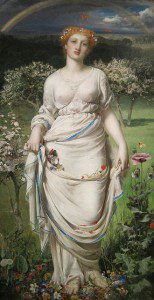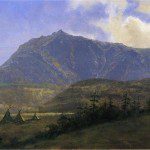 According to Carmichael, the “Invocation” was spoken over boys and girls in some districts and over young men and women in others. Although the feeling and tone of the “Invocation” are feminine, it was never understood as being “just for girls.”
According to Carmichael, the “Invocation” was spoken over boys and girls in some districts and over young men and women in others. Although the feeling and tone of the “Invocation” are feminine, it was never understood as being “just for girls.”
This point is particularly interesting in that the purpose of the charm is to endow the recipient with specific powers and virtues. The “Invocation” is not only a piece of folk magic but a commentary on virtue ethics. Many systems of virtue ethics seem to come from a very masculine perspective. For instance, the “nine noble virtues” of Asatru are courage, truth, honor, fidelity, discipline, hospitality, industriousness, self-reliance and perseverance. These are not portrayed as being “just for men,” but their relationship to the masculine warrior ethos of the Icelandic sagas is clear. As a discussion of “virtue ethics” based on a distinctly feminine perspective, the “Invocation of the Graces” provides an interesting contrast to the nine noble virtues.
Although I will continue to use the title “Invocation of the Graces” because it is so widely known, the Gaelic word translated as “graces” does not have the same connotations as the English word. Buadh in Gaelic doesn’t really mean “graces” at all. According to the Gaelic dictionary Am Faclair Beag, it actually means an attribute, faculty, talent or virtue. The closely related word buaidh means success, conquest, victory, impact, influence, mastery or predominance.
Rather than “Invocation of the Graces,” Ora nam Buadh could more accurately be translated as “Song of the Virtues,” with the understanding that the virtues in this case imply victory and success in life. In ancient times, the word buadh referred to the special powers or excellences of great heroes like Cuchulain, although these powers were understood to derive from the goddesses of the pre-Christian religion. According to the Dindsenchas, the goddess Macha (one of the three Morrigans) “diffused all excellences” and was the “sun of womankind.”
So, if the buaidh or “graces” are really virtues, powers or excellences traditionally believed to be granted by goddesses with solar connections like Brighid and Macha, then the “Invocation of the Graces” should be understood as the words of power with which Brighid grants the graces to Her devotees- in other words, a Brigidine sacred text.
In the first verse, Brighid says:
I bathe thy palms
In showers of wine,
In the lustral fire,
In the seven elements,
In the juice of the rasps,
In the milk of honey,
And I place the nine pure choice graces
In thy fair fond face…
The first thing that stands out about this verse is that it describes a ritual purification through bathing. As P. Sufenus Virius Lupus pointed out in his article “The Hidden Imbolc,” this concept is central to the oldest lore of Brighid’s festival, which involves a ritual bath using milk or butter to purify young warriors or reivers and reintegrate them into the community.
Carmichael tells us that the “Invocation” was used to bless young men and women, and expresses the opinion that it was originally composed for a young woman on her wedding day. What if it was actually composed for a young man going on or returning from his first raid against an enemy clan? Some versions of the “Invocation” protect the recipient from being harmed by swords, spears and other weapons. This is much more likely to be a concern for a young reiver than a young bride. Considering that the prayer was actually used to bless both boys and girls, it was probably phrased so as to apply to both.
The phrase Carmichael renders as “showers of wine” is frasa fiona. A fras is a rain shower or scattering of water, so a “shower of wine” is probably a sprinkling of wine over the palms.
The phrase Carmichael translates as “lustral flame” is liu nan lasa, which literally means “water of the fire.” Fiery water is a very ancient concept in Indo-European religions, and closely associated with the goddess Brighid and related deities. The well of wisdom at the roots of the World Tree is supposed to be filled with this fiery water.
The “seven elements” are the duilean of Gaelic lore, of which both the world and each individual human being are made. This is also an ancient Indo-European concept. Numerous different versions of the duilean exist. The “Body of Adam” text includes earth (flesh), water (blood), sun (face or eyes), clouds (mind), wind (breath), stones (bones) and spirit. However, the phrase used here is seachd siona, a different version of the seven elements listed by Am Faclair Beag as fire, air, earth, water, ice, wind and lightning.
The phrase Carmichael translates as “juice of the rasps” is subh-craobh. This refers to a raspberry bush or any other bush that produces wild berries. In the folktale of “Great Brid of the Horses,” Brid demands an offering of blackberries in winter. Wild berry juice or wine could therefore be seen as a symbol of Brighid.
Carmichael’s “milk of honey” is bainne meala, literally “honey milk.” Giraldus Cambrensis, in describing the Awenyddion or Welsh seers, has this to say:
These gifts are usually conferred upon them in dreams: some seem to have sweet milk or honey poured on their lips…
The Welsh word awen refers to the power of inspiration granted by the muse Cerridwen to the Welsh bards. It is equivalent to the Irish imbas.
So, this first verse of the “Invocation” describes a purification ritual in which Brighid washes the recipient’s palms and face with some kind of wine or mead made of berry juice, milk and honey. This drink is the “fiery water” of the well of wisdom, containing the powers of the seven primordial elements and the imbas of the goddess.
Loop of Brighid is published on alternate Thursdays. Follow it via RSS or e-mail!

















